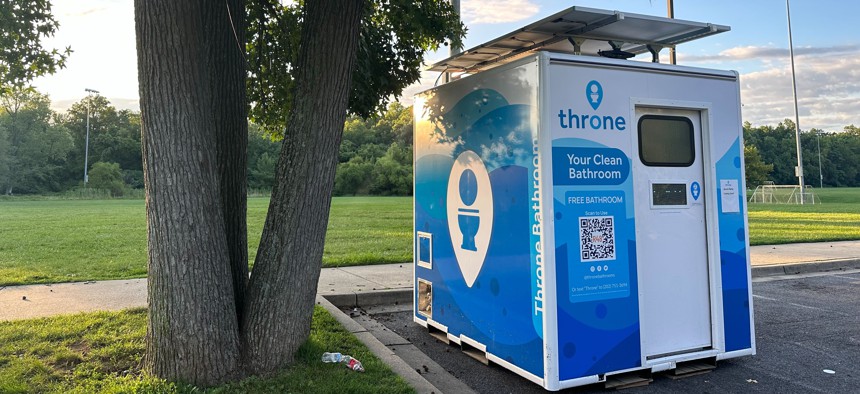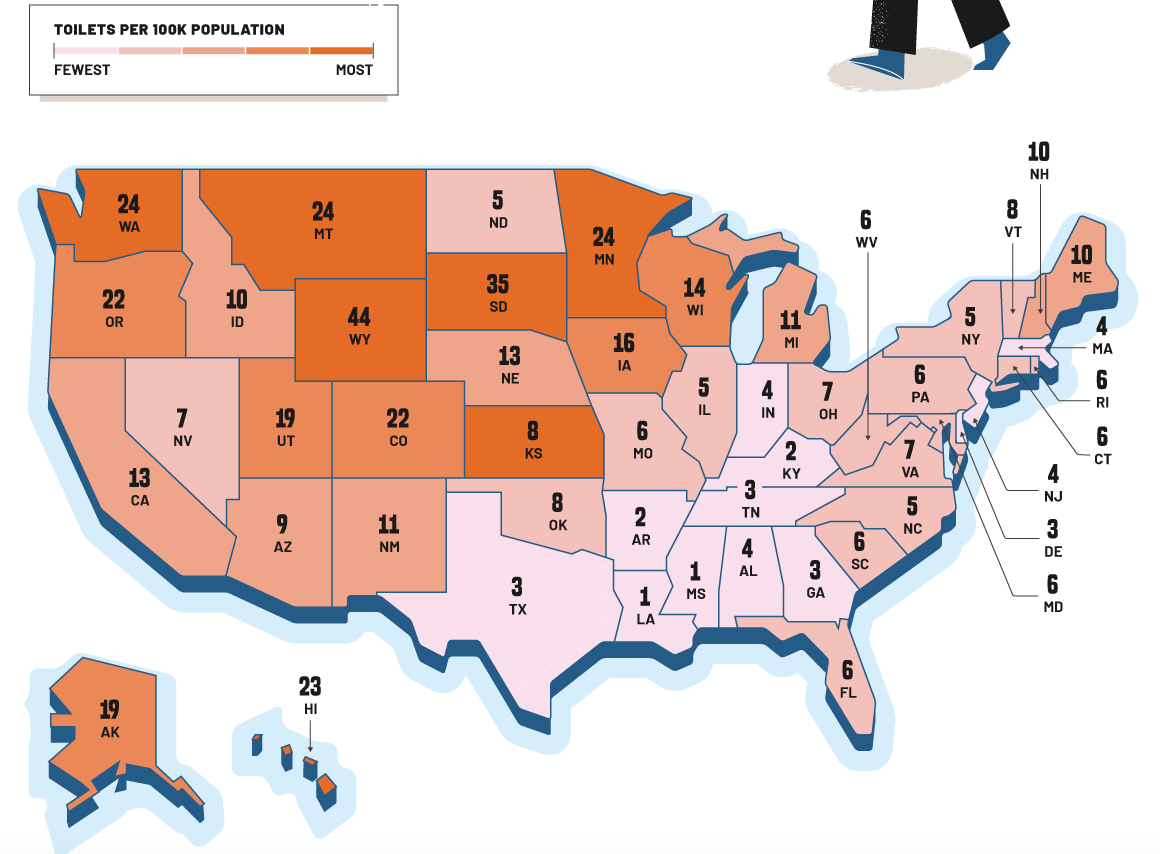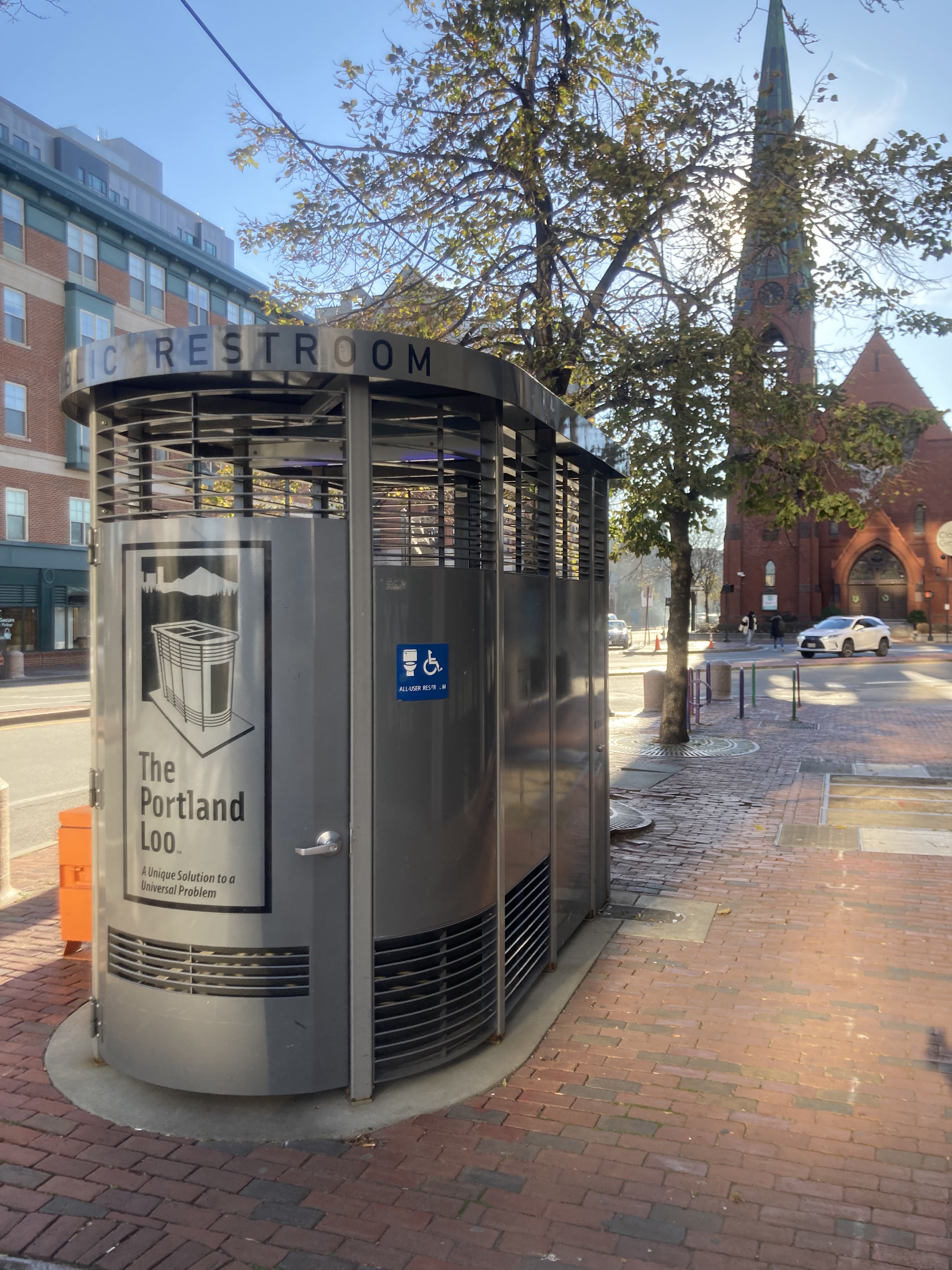Cities struggle to solve the public restroom problem

Hyattsville, Maryland, is using portable toilets from a local business, Throne Labs, in several of its parks. Elizabeth Daigneau

Connecting state and local government leaders
There's a lack of public restrooms in U.S., which particularly affects the homeless. New policies and portable toilet models are helping to address the shortage.
Mike sleeps on the streets. Every day, bright and early, he wakes up to the hum of traffic as commuters flood an adjacent roadway headed to jobs and school. Nearby, cars are already lining up at a Dunkin Donuts’ drive-thru, and businesses like the Family Dollar and a Shell Gas station are just opening for the day. Mike grabs his phone and begins a mile-long trek down a scenic greenway that meanders through a string of parks in the Maryland suburbs northeast of Washington, D.C. He is heading to one park in particular to charge his phone and use the public restroom.
Mike makes the trip every morning. He likes to get to the park early, when the only people around are runners or those walking their dogs. While his phone charges, he makes several loops around the park and stops to use the park’s bathroom. Mike, who asked that his real name not be used, says it’s the only facility available that early in the morning. There are no public restrooms near where he sleeps, and most of the businesses there only let paying customers use their facilities.
Mike’s daily routine is not unique, according to Steven Soifer, program manager of the American Restroom Association, a group that advocates for better public restrooms. “I’ve heard several stories from homeless people that they had to walk a mile to go to the bathroom,” he said. “And that’s just a bathroom, not a shower.”
Public restrooms in America are rare. On average, the U.S. has only eight public toilets per 100,000 people, according to the Public Toilet Index, a 2021 report by the British company QS Supplies. The U.S. is tied with Botswana and far behind Iceland, the country with the highest density of public bathrooms—56 per 100,000 people.

The lack of bathrooms is not a new problem, but the urgency to deal with it has only grown more acute as homelessness rates are on the rise in most cities—climbing nationally by about 6% since 2017, according to data from the National Alliance to End Homelessness. A side effect of too few public restrooms and more unhoused people is that public urination and defecation have also risen.
“This year, I have probably gotten calls from half a dozen municipalities—from Bangor, Maine, to Kansas City, Missouri, to cities in California—looking for solutions,” said Soifer. “This issue is rising to prominence for a lot of reasons, but one of the bigger motivators is that the homelessness issue has become overwhelming to municipalities.”
This spring, it came to a head in San Diego when the city experienced an outbreak of hepatitis A infections among homeless residents. The disease, which can cause deadly liver complications, did not spread as quickly among the unhoused as it did in 2017, when more than 500 got sick and 20 died. But this winter’s outbreak prompted the San Diego County Health Department to ask in a letter that the city “deploy additional hand-washing stations and portable restrooms to serve the unsheltered.”
Hepatitis A is transmitted through fecal contamination, which impacts people living on the streets, especially in areas where there are no public restrooms or those restrooms are closed for the night, forcing the unhoused to use buckets or go on the street.
In response to those conditions, Megan Welsh Carroll, the director of the Project for Sanitation Justice at San Diego State University, asked a simple question: Where are the public restrooms located?
She learned that San Diego County did not have a standardized database of public restrooms, and that several of its municipalities had no public information on the restrooms they managed. She and her colleagues at the Project for Sanitation Justice submitted public records requests to locate those facilities, compiled the responses and dropped them on an online map.
The data painted an alarming picture: In downtown San Diego, the group identified 22 public restrooms, only two of which are open 24/7.
Of course, the need for public restrooms is not just an issue for the unhoused. The lack of options also affects older Americans, children, pregnant women, gig workers like Uber and Lyft drivers, transgender persons and people with certain medical conditions. As part of its age-friendly community initiative, Boston has also created a public toilet map, which displays a selected restroom’s exact location, hours of operation and other important information.
Carroll, who is also a board member of the American Restroom Association, argued in a op-ed in the Los Angeles Times that once cities know where restrooms are, they can “use that information to improve the quality of existing facilities, identify where more are needed and explore creative solutions to increase access, such as public-private partnerships and corporate sponsors to create more restrooms.”
An example of the approaches that Carroll, Soifer and other advocates are seeking is playing out in Hyattsville, Maryland, where the city just outside the district is embracing two options to address the lack of public restrooms in the community.
“When we do park updates, we conduct a vetting process through community meetings,” said Lesley Riddle, director of the Hyattsville Department of Public Works. “One [piece of feedback that] we’ve gotten back very clearly is a lack of public amenities.”
After looking at composting toilets, Riddle came across Portland Loo toilets while vacationing in Galveston, Texas. The toilet is a durable kiosk with anti-graffiti wall panels that are easy to clean, have easily interchangeable components and is accessible to people using a wheelchair. While the toilets are energy efficient, they still must be connected to electrical and sewer systems.
The first Portland Loo, which was installed 15 years ago, was the brainchild of City Commissioner Randy Leonard, who wanted to build a 24-hour restroom with full public access in response to the rise in the city’s homeless population. The restroom, he argued, would alleviate the need for people to disturb local businesses for their facilities and would reduce public defecation and the spread of disease. Today, the Portland Loo is used in many cities across the U.S.

Riddle bought two for Hyattsville, and plans to install them in two city parks. Her department is also testing toilets from a local Maryland-based company called Throne Labs, which has a fleet of portable, high-tech public toilets. Throne users can find a location via the company’s app and use a QR code to open the bathroom. Inside is a flushable toilet, a flushless urinal, a sink, a trash can, a robust ventilation system and a mirror.
Thrones are solar-powered—although they can be plugged into power if the location doesn’t get direct sunlight—and they don’t require a connection to water or sewage. Like other portable flushable toilets, the waste goes into a holding tank under the system. The toilets are dual flush and use gray water from hand washing. Sensors help the company determine when to clean the unit or refill the water tanks.
While users currently scan a QR code to access a Throne, the company is working with the city of Hyattsville to create tap-to-enter cards for people without smartphones and on making the units more wheelchair accessible. The city plans to continue using Throne toilets, says Riddle, in areas where there is a need for a public restroom, but no electric, sewer or water hookups.
Riddle says that all in, one Portland Loo costs about $225,000 to buy and install. Once it is installed, the city will have maintenance and legacy costs. With the Throne toliet, the city has an annual contract, which includes maintenance costs.
“There are two ways to look at it,” she said. “There’s a consistent cost that I can bank on every year, or I have this large upfront cost and [ongoing] maintenance.”
There are a lot of solutions, says Soifer of the American Restroom Association, but in his conversations with municipalities “it all boils down to cost and how to finance it.”
One solution that Soifer thinks is largely untapped is partnering with private businesses. Plumbing codes, he says, already require that businesses make their bathrooms for employees available to customers. But many don’t and there are no repercussions. Soifer suggests that cities offer businesses financial incentives to make their bathrooms available. The district’s Public Restrooms Act, for example, does just that, calling for a program to reward businesses that open their restrooms to the public.
Other cities abroad allow businesses to charge for the use of their facilities. In 2022, London introduced the Community Toilet Scheme, where shops and restaurants can list their toilets as open to the public on the city’s website in exchange for a small fee.
“It is clearly a public health issue,” said Soifer, adding that his group lobbied the Biden administration to classify public sanitation as a public health issue and put responsibility for it under the Department of Health and Human Services. “For the last 30 years, inadequate public restroom facilities have been growing. It has reached a tipping point.”

NEXT STORY: Round-the-clock speed cameras improve safety in a city that never sleeps


